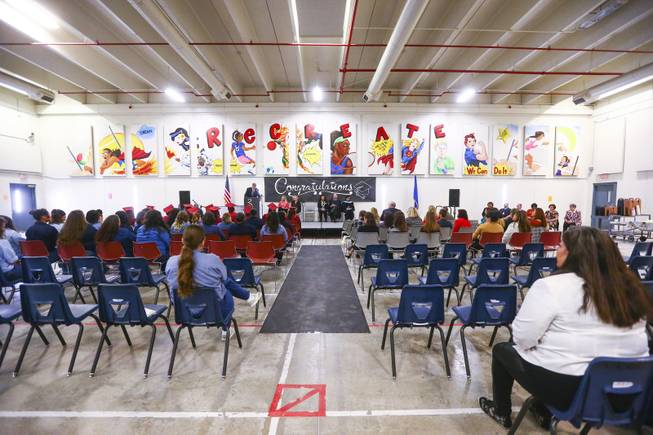
Miranda Alam / Special to the Sun
Inmates and invited guests participate in a graduation ceremony at the Florence McClure Women’s Correctional Center in North Las Vegas on Monday, May 20, 2019.
Tuesday, July 2, 2019 | 2 a.m.
View more of the Sun's opinion section
The power and potential that are unlocked when people are given second chances has been on vivid display these past couple of weeks in Nevada.
You could feel it Wednesday at Florence McClure Women’s Correctional Facility, where 30 inmates received certificates from the College of Southern Nevada after completing a nine-month educational program during their incarceration.
A similar ceremony took place Wednesday at High Desert State Prison. And the day before, the Las Vegas Metro Chamber of Commerce announced it had entered a partnership with Hope for Prisoners, a national organization that helps reintegrate inmates into their communities after they serve their sentences.
Then, on Monday, came the enactment of a new state law that restores voting rights to felons upon release.
These are all steps in the right direction for Nevada. Investing in inmates and giving them a pathway to being contributing members of society is better for all of us than warehousing them and then continuing to punish them after they walk out of prison.
As it stands today, nearly 30% of the inmates in our state prisons are arrested again within three years of their release. By driving down that figure, we can make our communities safer and our economy healthier.
Programs like CSN’s give inmates a pathway to employment by allowing them to obtain up to six college credits, along with certifications for auto repair and the culinary trade.
Meanwhile, the chamber’s new partnership with Hope for Prisoners will provide long-term job training, mentorship, counseling and financial tutoring to inmates who are reintegrating into our communities.
It’s a promising situation: Inmates are getting a foundation for success through educational programming while they’re behind bars, then are getting assistance on the back end as they re-enter the job market.
The chamber is spreading word in the business community about Hope for Prisoners, touting its potential to provide capable employees in the tight labor market and noting that businesses that hire a former felon may be eligible for tax credits of as much as 40% of the employee’s first-year wages. In addition, the chamber reported, employers could be eligible to participate in a federal bonding program that limits their risk, liability and insurance costs.
“Our businesses tell us they need qualified and dedicated employees. The clients of Hope for Prisoners represent new sources of talent with varied skills and life experiences that can translate into exceptional hires,” said Mary Beth Sewald, the chamber’s president and CEO, in a release.
Programs like these won’t eliminate recidivism, but they have been proven to keep inmates from reoffending.
They also can keep on giving, helping break cycles of poverty and crime.
Florence McClure inmate Alexandria Montgomery spoke to that point recently in an interview with Las Vegas Sun reporter Kelcie Grega, who spotlighted the efforts of Montgomery and other participants in the prison’s education and training programs. Montgomery, who earned her high school diploma at Florence McClure last spring and is now taking paralegal training classes, said she was motivated partly by the desire to be a good role model for her daughter.
“Like I tell my daughter, I go ‘Mija, you need to graduate at 18 when you’re supposed to, not when you’re 33 years old like I am,’ ” Montgomery said.
Truly rehabilitative programs like this can help Nevada make a turnaround from years of going the wrong direction in its corrections system.
The lack of such programs, combined with overly punitive sentencing policies, caused the prison population to grow significantly here despite a falloff nationwide. That increased the burden on taxpayers and perpetuated cycles of recidivism.
But over the past two legislative sessions, and particularly the 2019 session, the state has made progress. Sentencing policies were adjusted this year with an eye toward reducing the number of nonviolent offenders, while the law restoring felons’ rights gives them a stake in their community and thus an incentive not to reoffend.
There’s still a long way to go, and this session was far from perfect in terms of justice reform — an ambitious reform bill emerged heavily watered down after drawing intense resistance from prosecutors and law enforcement.
But the events of the past two weeks offer a glimmer of what could be if we give inmates more chances to better themselves as opposed to keeping the ladder beyond their reach.
As a choked-up Gov. Steve Sisolak told the graduates last week at Florence McClure: “You each answered the call. You showed yourselves it can be done. You should be proud to want to improve your life.”
As Nevadans, we’re certainly proud of these high-achieving inmates. In their quest for a better future, they make life better for all of us.
